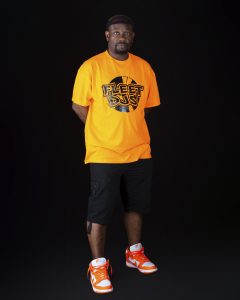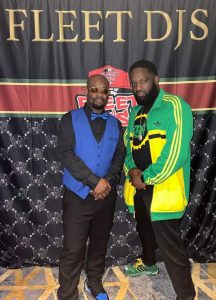Over the past decade or so, sneakers have become increasingly popular as a fashion statement. Once seen as purely functional footwear, sneakers are now considered by many to be essential pieces of any wardrobe. This shift in perception can be attributed to several factors, including the rise of hip-hop culture, the increasing popularity of athleisure, and the growing availability of limited-edition and high-end sneakers. This intersection of music and fashion was clearly evident in my recent interview with the legendary music contributor who goes by one name, Klassik.
Klassik is one of the masterminds behind the world-renowned Fleet DJs. The Fleet DJs organization was started in 2001 as a network for DJs to share ideas and resources. Well, that idea has continued to expand, and the organization has grown to where it supports models, producers, photographers, hosts, graphic designers, and now there is an online magazine- Fleet Mag. Fleet also has Fleet Radio, Fleet DJ Radio, 60 radio stations, and Fleet TV. Fleet has continued to maintain the wave of technological trends boasting eight websites and two mobile apps. Fleet DJs is one of the biggest DJ networks worldwide, and their CEO goes by the name, Klassik.
Not only is Klassik a Boss, but he is also a sneakerhead. So, in this interview I asked him questions about his organization, as well as his sneaker game. Mainly this article is about fashion and how it intersects with music and impacts culture. The specific fashion item discussed here is sneakers and how the fusion of music, and pop culture collided to create this world of style and musical inspiration.
The History of Sneakers as Fashion
The history of sneakers as fashion can be traced back to the early 1900s, when tennis players began wearing white canvas sneakers. These sneakers were originally designed for comfort and performance, but they quickly caught on with the public as a stylish and versatile option. In the 1950s, Chuck Taylor All Star sneakers became popular among teenagers and young adults, and they were soon adopted by other subcultures, such as musicians and artists.
The Rise of Hip-Hop Culture
In the 1980s, hip-hop culture played a major role in popularizing sneakers as fashion. Hip-hop artists such as Run DMC, Kool Moe Dee, and LL Cool J often wore sneakers in their music videos and performances, and they helped to create a new association between sneakers and coolness. Nelly even created a song about sneakers; Air Force One. As a result, sneakers became increasingly popular among young people of all backgrounds.
I remember growing up, my brothers had one or two pairs of tennis shoes at any given time. They wore them until they grew out of them or until they were destroyed, whichever came first. Historically speaking, sneakers were more functional than fashionable at this point. However, today, children and adults alike have treasured collections of sneakers that fill their wardrobes, cupboards, and even the spaces under their beds. My grandchildren will not even walk in the grass with their sneakers on their feet. When I shared this with CEO Klassik, he said, “That’s right. The number one rule is: “Thou shalt not get thy sneakers dirty.”


Sneakerdom
A true sneakerhead, like Klassik is an investor of sneakers. He says his collection includes about 80 pairs of sneakers. By the way, those 80 are not just any common sneakers, we’re talking keepsakes, rare, and exclusive! You heard me! I won’t disclose everything, but trust and believe there are some exclusives in the collection; by the way, you did not hear that from me.
Like any sneakerhead or collector, Klassik has his sneaker collection organized. When I asked him why, he replied, “So they don’t get dirty, so they don’t get dust on them, and so they can be seen at a glance.” He keeps them in clear boxes so he can see what he has. I can attest that they are indeed visible. He gave me a virtual peek into his sneakerdom, which was stacked from floor to ceiling. I thought my shoe collection was impressive, but I must admit that Klassik’s sneaker game is truly remarkable. It is organized, colorful, and a sight to behold. A true collector, indeed! I inquired if he had a collection of sneakers that he wore and those that he did not, or, to put it another way, those that he cherished. He responded that they were separated because it all depended on what he felt like wearing. He said, “I have my comfortable sneakers and those that aren’t comfortable, like Jordans; they aren’t comfortable.” I was taken aback by this information.
Klassik explained that keeping them organized helps him when he’s putting together an outfit with his sneakers. I asked him, “When you get dressed in the morning, do you start with your sneakers and build your outfit around them, or do you start with your outfit and then choose the sneakers to match?” He replied, “It depends on how I’m feeling.” “Sometimes I start with the shoes, and sometimes I start with the outfit. It really just depends on the day.”
Klassik, like an NBA player or any urban executive, pairs his gear with his sneakers. In his words, “this helps me create my own unique style.” When people see him, they stare, they comment on his outfit and marvel at his sneakers. Even in today’s culture, executives are no longer dressing in suits. Instead, they dress with an urban flare with their sneakers on.
I remember when wearing sneakers to events like church, a formal ball, or to work was considered inappropriate, but now it is in fashion to wear sneakers just about anywhere. Sneakers now go from the street to the boardroom and to black tie affairs. Donning a pair of sneakers is no longer frowned upon in the workplace or on more formal occasions. And a true sneakerhead will sport a sneaker in any setting.
Legacy
Klassik replied that he did have a number of sneakers in his collection that have never been worn. He explained that he only wore sneakers when he was dressed up, and as a result, many of his sneakers remained in their boxes. He also shared that his most prized sneaker was a pair of Christian Diors, which he declined to disclose the price of. When asked if sneakers typically come with an authenticity document, Klassik confirmed that some do, depending on where they are purchased. He gave the example of Stock X, a secondary sneaker resale website, which puts all sneakers through a stringent verification process to confirm their authenticity. I likened this process to proving the provenance of artwork.
I also inquired of Klassik if he had included his sneaker collection in his will for his children. He replied, “I never thought about that.” He then pondered which of his three children might be interested in maintaining his collection and not selling it. He did say that his youngest exclaimed, “Dad, I want those, I want those, I want those, and I want those!” Perhaps the youngest son will be the one to inherit the collection. The jury is still out on that.
Regardless of who the chosen heir may be, I suggested that Klassik consider bequeathing his sneaker collection in his will. Based on my research, the global sneaker resale market was valued at $6 billion in 2019 and is projected to reach $30 billion by 2030. Sneakers are more than just any other collectible; they transcend generations and demographics. Sneaker collecting is a big business, comparable to collecting art or other valuable items.
No one can deny that sneakers are transformative and that they have transcended the world of creativity, culture, and fashion. Today, there are high-fashion brands like Michael Kors, Steve Madden, Gucci, Balenciaga, and Louis Vuitton who have a formidable presence in the sneaker business. Sneakers, once the symbol of athleticism, have transcended their primary function and have become fashionable objects of desire. From sportswear and street style to catwalk fashion, sneakers have made their mark as cultural commodities.
Music, fashion, and culture have always been intertwined with each other and influencing and inspiring the other. The Fleet DJs have positioned themselves to be at the epicenter of this phenomenon and Klassik as CEO will ensure that his organization and his sneaker game will continue to thrive.
Videographer: Delfontain Stoutingberg